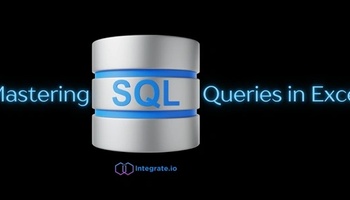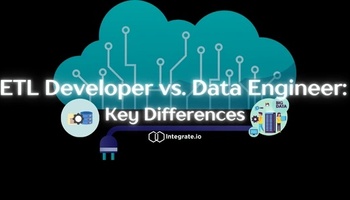Digital Transformation has ushered in a new era in business where every company is becoming a technology company (and with good reason). According to IDC, digitization has created a global market opportunity worth a staggering $20 trillion (over 20% of global GDP).
With that kind of money on offer, every business needs to leverage technology to create its own path that can guarantee a competitive advantage.
By using big data and analytics, Business Intelligence (BI), extending and streamlining existing business processes, and supporting new business models, enterprises are not only disrupting the industry but also themselves.
However, to be successful, companies need to find a way to break down data silos. Regardless of the industry, if there are data silos, you are missing opportunities and making less informed decisions instead of “smart” decisions.
Why Is Data Centralization Important?
When data isn’t centralized and lives in multiple places, it makes it difficult for teams to answer even simple questions. At the same time, fragmented and incompatible data will also stifle innovation and make your organization less competitive.
Point to point connections help companies optimize workflows and automate the use of multiple web applications together. However, while this approach to managing data (from social media platforms, websites, marketing campaigns, and more) works efficiently, you won’t be deriving the most value from your data.
For example, many businesses push Google Adwords data to Salesforce to enrich Salesforce data. This approach will allow companies to understand their marketing campaigns better.
However, when Adwords, Salesforce, and other data sources are centralized, organizations will be well-placed to engage in in-depth analysis and leverage BI tools to make better data-driven decisions (for the business as a whole, not just for promotional activities).
Integrating data to merge the silos isn’t an easy undertaking, but it can be achieved. It’s worth the effort as centralizing all the data in a data warehouse, or a data lake will help drive an efficient and effective data-driven strategy for your company.
What are the key benefits of centralizing data to become more data-driven? Let’s take a look.
1. Helps Optimize Data Assets
Data is the new gold. Data, when used effectively, is a valuable asset that helps businesses perform better, drive revenue, boost customer satisfaction, and optimize expenses.
When you centralize the data that’s being generated from multiple sources, companies will be well-placed to make better business decisions. When data is decentralized and disorganized, data becomes an obstacle rather than an asset.
So processing and managing the data in a centralized location can help optimize the data, cost-effectively. This approach will also help the company make data-driven decisions, quickly.
2. Enhanced Consistency
When everyone is working with the same data and insights, it improves consistency throughout the organization. The decisions you make based on data analytics will also make more sense and be more transparent to other departments within the organization.
When it comes to marketing campaigns, this approach also ensures that your audience is getting the same high-quality information consistently throughout the customer journey. It will also provide concrete direction to everyone creating content throughout the organization.
3. Focus on What’s Important
When all the data is centralized, processed, cleansed, analyzed, and stored in one place, your staff will spend less time organizing the data and more time focusing on achieving business goals.
Centralizing data in a data warehouse also provides BI teams and marketing teams an in-depth understanding of business processes. For example, when your marketing team has a better understanding of how supply chains work, they will be able to forecast and troubleshoot long-term strategies with increased accuracy.
4. Enhanced Customer Experiences
In the digital age where customers have high expectations of brands, they quickly notice inconsistencies. However, when data is centralized, it’s easier to get every department in-sync to deliver the same messages and experiences consistently.
When everyone in the organization is working with the same data and insights, your company will also be well-placed to deliver enhanced customer experiences.
5. Saves Time & Money
Raw data is practically useless unless it’s cleaned and processed for analysis. When you work with data that is centralized in a data warehouse or data lake, it also comes with the added benefit of reduced reporting times.
This means that you’ll be able to visualize and make sense of the data behemoth in a legible, visible, and simple format.
If you have data spread out across multiple platforms and point to point connections, you will have to generate numerous reports. Whenever that happens, it’ll be challenging to see the “bigger picture.”
When teams spend less time generating and compiling reports, they will have more time to work on their strategies and data-driven decisions. This approach will also help you save more resources as centralized data makes inefficiencies more visible while making solutions more evident and effective.
For example, Integrate.io’s rich set of tools for data centralization and management helps companies better manage and track their budget and expenses. Whenever data lives in different locations, it’ll create multiple silos that will make it challenging to identify processes that lead to inefficiencies and waste.
A lot of these processes, including the creation of backup repositories, can be automated to generate and export data in different formats. This approach can also be leveraged to create data dumps to share with other systems.
Conclusion
Centralized data management enables enterprises to seamlessly transpose, transform, and manage data to cater to a variety of analysis requirements. It’s also a better approach to securing data to maintain privacy and compliance.
Data centralization leads to more meaningful reporting, ensures that the same data is available across the organization, and increases your ROI.
With a robust data management system, companies can provide authorized access to stored data. It’s also a better approach to share data securely and seamlessly.
Going forward, it’ll be critical for businesses to centralize data to ascertain which processes are working efficiently and which methods aren’t.
It will be critical to making intelligent data-driven decisions that’ll ensure business relevance. It’s also the best approach to ensuring that data remains an asset and not an obstacle.









